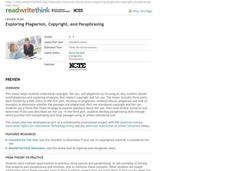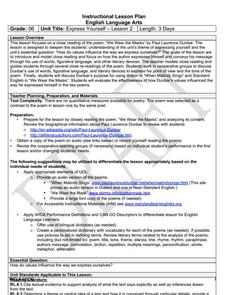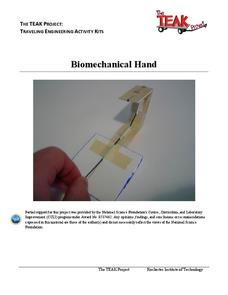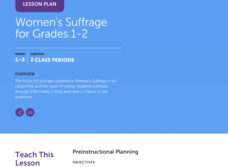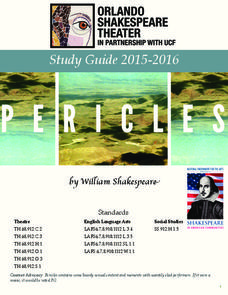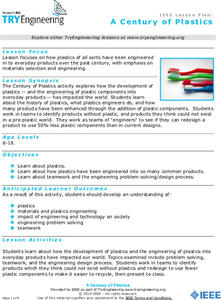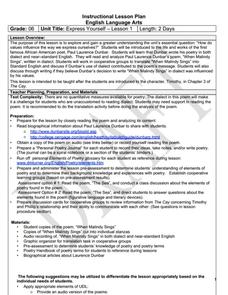ReadWriteThink
Exploring Plagiarism, Copyright, and Paraphrasing
Plagiarism, copyright, and fair use are the focus of a three-part instructional activity designed to inform scholars of how to properly cite others' work. First, pupils use a KWL chart to begin thinking and discussing plagiarism. They...
Curated OER
Creating a Classroom Constitution
Youngsters identify and interpret the importance of having rules in order to maintain order at home, at school, in their community, and in the United States. They create a working Classroom Constitution that governs the classroom and...
Curated OER
Insects?
Can you tell the difference between a bug and an insect? Aren't they the exact same thing? Let your learners explore, identify, classify, and document the differences they see in bugs and insects. The activity sheet suggests several...
American Immigration Law Foundation
No Pretty Pictures
Here is a nice set of activities and discussion questions to accompany your class reading of No Pretty Pictures, a memoir of a young girl's experiences and struggle for survival during the Holocaust.
Curated OER
6th Grade: Express Yourself, Lesson 2: Close Read
The second lesson plan of a pair about Paul Laurence Dunbar, this plan focuses in particular on his poem, "We Wear the Masks." After a short historical introduction, class members conduct a series or readings, marking up the text and...
Curated OER
The Old Man and the Sea: Vocabulary Strategy
Readers read more closely when they think critically about a text. Discuss the words and concepts from Ernest Hemingway's The Old Man and the Sea with a class activity that asks readers to not only record unfamiliar words they find in...
Rochester Institute of Technology
Biomechanical Hand
In 1993, five biomedical engineers in Edinburgh, Scotland, created the first functional bionic arm. In the activity, learners explore the world of bioengineering through discussion and hands-on exploration. In groups, participants...
Scholastic
Women's Suffrage for Grades 1–2
Scholars take part in a grand conversation after they examine facts and stories about the Women's Suffrage Movement. Eight discussion questions bring light to influential women, the importance of voting, citizenship, and voting rights.
University of Pennsylvania
From the Dreyfus Affair to the World Today
Historical events do not occur in a vacuum. Such is the case of the Dreyfus Affair, where the connection between Captain Alfred Dreyfus, Emile Zola, and Hannah Arendt is fused by the events of the early 20th century. The informative...
Orlando Shakes
Pericles: Study Guide
Everyone loves a great riddle, right? Everyone except for the characters in Shakespeare's Pericles, who will be killed unless they answer the king's riddle correctly. With the study guide, scholars use words coined by Shakespeare to play...
Serendip
Carbohydrate Consumption, Athletic Performance and Health – Using Science Process Skills to Understand the Evidence
Should athletes carb load before an event or consume carbohydrates during the competition? Scholars discuss how to set up a hypothesis and experiment to answer a question relating carbohydrates and athletic performance. Then, they read...
Institute of Electrical and Electronics Engineers
A Century of Plastics
After reading about polymer materials, engineer trainees examine how plastics have been integrated into everyday products. In groups, they compile a list of products made entirely without plastics and then, as a closing activity, try to...
Film English
Real Beauty
Consider the theme of beauty with discussion about what makes person beautiful and the well-known short film put together by Dove skin care. Class members examine some of the images from the film and discuss the message of the film as...
West Virginia Department of Education
Editorials: The Guiding Voice of Authority?
How much can opinion influence a news story? A standalone resource discusses the importance of John Brown's Raid through the lens of journalism. Learners analyze two different texts, one from the perspective of the North and the other of...
Missouri Department of Elementary
Fly Your Kite
Encourage scholars to become a productive community member with a kite-themed lesson. Following a review and discussion, learners complete a Venn diagram that displays the connection between character traits needed to make a home and...
C-SPAN
The Impact of Citizens United v. FEC
What began as an effort to show a movie by an interest group has impacted financing of federal elections. Did the Citizens United case lead to more "dark money" in politics, or did it shine a light with more speech? Using video clips...
PBS
Reading Adventure Pack: Oceans
Flotsam by David Wiesner and The Magic School Bus on the Ocean Floor by Joanna Cole, illustrated by Bruce Degen, begin a reading adventure pack focusing on oceans. With story listening and thoughtful discussion, scholars complete several...
Center for Civic Education
What Basic Ideas About Government Are Included in the Preamble to the Constitution?
Young historians explore the meaning of the Preamble to the US Constitution in this upper-elementary social studies activity. Working with partners or in small groups, children discuss the purpose of government before reading and...
Curated OER
Finding Meaning in the Badge
Children who are three to five years old study two rank badges from the Qing dynasty to develop an understanding of social rank, language skills, and symbolism. The lesson is discussion-based and requires learners to compare and contrast...
Curated OER
6th Grade: Express Yourself, Lesson 1: Poem
While originally created to accompany The Cay, this poetry activity could be used on it's own, especially if you are working on dialect. Class members conduct a close reading of "When Malindy Sings" by Paul Laurence Dunbar and listen to...
Curated OER
“THE LORAX” by Dr. Seuss
Few children's books convey the message of conservation as well as Dr. Seuss' The Lorax. Read the story aloud, emphasizing the interconnectedness of plants and animals in an ecosystem and discussing different ways people can help the...
Pulitzer Center
Food Insecurity
Food insecurity, whether as a result of food scarcity or a lack of nutritious food, is a growing and serious problem in the world today. After discussing the concept of food insecurity, learners listen to an NPR radio broadcast on the...
National Gallery of Canada
The Body Tells Its Story
Incorporate sculpture into your art curriculum. To start, pupils discuss the artistic process and topics of marginalization. With the discussion in mind, individuals select images to inspire sculptures of people that they will present to...
Signing Time Foundation
What is the Water Cycle?
Dive into an exploration of the water cycle cycle with this simple earth science lesson plan. After first discussing where rain comes from, young scientists define the terms condensation, evaporation, transpiration, and precipitation as...
Other popular searches
- Discussion Essay Structure
- Panel Discussion
- Group Discussions
- Book Discussion
- Discussion Groups
- Discussion Board
- Guided Discussion
- Oral Discussion
- Discussion Webs
- Discussion Questions
- Class Discussion
- Discussion Starters


